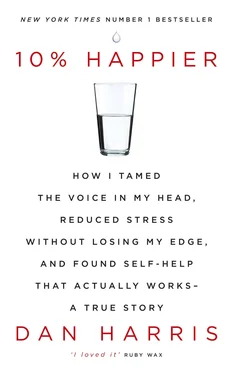But then we got to the hotel. To my surprise, it was a Marriott, and a nice one at that—much larger and more elegant than the average American version. I dropped off my bags then went straight up to the presidential suite, where the ABC team was working. This was my first time meeting many of these people. They were mostly from our London bureau—swashbuckling types, veterans of places like Bosnia and Rwanda. They seemed completely comfortable with the cognitive dissonance of being in a dangerous, impoverished country where we had uniformed hotel staff bringing us cellophane-wrapped platters of cookies and mixed nuts twice a day. My fellow correspondent Bob Woodruff strolled in and nonchalantly ordered scrambled eggs from room service.
Things got edgier pretty quickly. Within just a few days, I got word that we’d received an invitation from the Taliban, who were still ruling Afghanistan, to come visit their home base in Kandahar. It would be a sort of embed. At first blush, it sounded like a supremely dumb idea—to go behind enemy lines, a guest of the actual enemy—and it provoked a spirited debate among our staff. We had a big meeting and argued it out. I went through the motions of listening to both sides, but it was really a foregone conclusion: there was no way I was going to miss this.
I tried to call my mother to let her know where I was going before she saw it on TV, but I couldn’t reach her at the hospital where she worked. So, against my better judgment, I called my father, the far more emotional parent. When I told him the plan, he started to cry. As the line went silent, except for the sounds of my dad catching his breath, the myopia of exhilaration gave way to remorse. Up until this point, I had been thinking only about what was in this trip for me; I hadn’t considered the special kind of hell it would create for my family. My dad recovered pretty quickly, engaging in characteristically self-deprecating humor: “You have a Jewish mother—it’s just not your mother.”
That night, I felt so guilty—and, frankly, scared—that I couldn’t sleep. The next day, I was part of a small group of reporters who boarded a bus to the unknown. After a long, spine-rattling ride on the unpaved main road that bisects southern Afghanistan, we arrived in the middle of the night at a complex of squat government buildings on the outskirts of Kandahar. The American air campaign had knocked out power and the whole city was pitch-black. We quickly went to the roof of one of the buildings, established a satellite signal, and taped a report in which Peter Jennings, at the news desk in New York, asked me questions about our journey. After talking to me, Peter—who still had a national newscast to prepare for—took the time to call my parents and let them know I was okay.
The next three days were a surreal, heady blur. We were ferried around town by hirsute, heavily armed men. For the most part, they showed us things they wanted us to see for PR purposes, including bombed-out buildings in which they claimed innocent civilians had been killed by U.S. warplanes. But it was the offscreen demeanor of these Taliban fighters that made the strongest impression on me. Aside from the top commanders, who engaged in the requisite propagandist puffery, the rank-and-file soldiers were actually easygoing and sociable. They were kids, really. They taught us local curse words. (Apparently “donkey” is a serious insult in Pashto.) At one point, one of them whispered to me, “Take me to America.”
I included a lot of this kind of color in my reports and received laudatory emails from the home office that were head-swimmingly intoxicating for a young reporter on the make. Peter was referring to me on the air as “our man in Afghanistan.” My crew, a pair of Brits, spent many hours ribbing me, predicting that I was going to be “an insufferable twat” when I got home. They would act out imagined scenes of me in New York City bars with friends, interrupting every conversation with, “Yeah, yeah, yeah—did I tell you about the time I was in Afghanistan?”
This trip was my first taste of what I would describe as journalistic heroin: the pure, sick rush of being somewhere you are not supposed to be and not only getting away with it but also getting on TV. I was hooked.
When I got back to New York, though, I didn’t have much time to play peacock. I was greeted with a public repudiation in the New York Times . Arts critic Caryn James compared my coverage unfavorably to the BBC’s, calling mine “warm and fuzzy.” It was a hammer blow to my psyche. I bitterly disagreed with her, but many of my colleagues did not. Her article cemented the impression that I was too green to do this job. Around the office, I immediately went from hero to donkey.
A few weeks later, the Foreign Desk decided to give me a second chance, sending me this time to Tora Bora, where Osama bin Laden was holed up and under assault by local Afghan warlords on the American payroll. In the taxi on the way to the airport, I got a call from Peter. He told me the consensus was that I had blown it the first time around, and that now I really needed to prove myself. I spent much of the flight in the fetal position.
There was no Marriott in Tora Bora. Upon arrival, we paid an opium farmer to let us sleep in his ramshackle compound of mud huts in the middle of an iced-over poppy field. There was a large, smelly ox tied up right outside the door, and every day when we came home for dinner, there would be one less chicken running through the yard.
On this assignment, I redeemed myself. Part of what turned things around for me was a scene, captured on video, where I was shooting a “stand-up,” the part of a news story where the reporter speaks directly to the camera. I was perched on the side of a mountain, and right in the middle of my spiel, there was a whistling noise overhead. I had never heard gunfire up close before, so it took me a second to realize what was happening and dive to the ground. There was nothing warm or fuzzy about this. My bosses ate it up.
There were, however, two embarrassing things about this moment. First, a close inspection of the videotape revealed that none of the Afghans in the frame behind me ducked, or even looked particularly concerned. Second, my immediate thought as that bullet whizzed over was: I hope we’re rolling on this .
This was new. If gunshots had gone off in a situation where I was not on the job, I would have wet my pants. I had no record of courage in my personal life. No military service, not even any experience in contact sports. My only prior brush with danger was when I got hit by a cab after wandering into an intersection in Manhattan without looking. When you’re covering a news story, however, there’s a tendency to feel bulletproof. It’s as if there’s a buffer between you and the world, an exponentially more dangerous variant of the unreality you feel when taking a stroll while listening to your iPod. In the context of combat, my reflex to worry had been completely overridden by my desire to be part of the big story.
Tora Bora was a military failure—with Bin Laden most likely scurrying along a goat trail into Pakistan—but for me it was a resurrection of sorts. Having regained the trust of my bosses, I spent the next three years shuttling back and forth between New York and places such as Israel, the West Bank, Gaza, and Iraq. I was like a slightly less dorky Zelig, somehow materializing in the backdrop of the world’s most important historical events.
These were assignments that entailed repeated exposure to grotesquerie. In Israel, outside a seaside hotel after a suicide bombing, I watched as a gust of ocean breeze sent a bedsheet billowing off the ground, revealing a row of legs. In Iraq, a group of marines and I stared down at a bloated corpse on the side of the road as we collectively realized that what we thought were gunshot wounds in the man’s face were, in fact, drill holes. In the West Bank, I stood next to a father, watching bodies being dumped from a forklift into an impromptu mass grave in a hospital parking lot. The man let out a sustained, high-pitched wail as he spotted his own son tumbling into the pit.
Читать дальше












